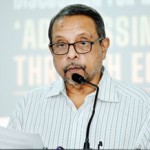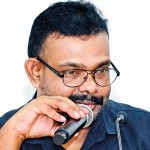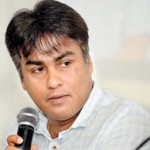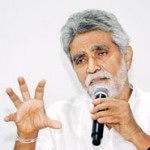News
Focus on hate speech for media personnel
View(s):Fifty one percent of women are subjected to hate speech yearly, said Head of Advocacy at Hashtag Generation Saritha Irugalbandara at a discussion on ‘Addressing Hate Speech Through Education’.
The event was a joint collaboration of the Press Complaints Commission together with Hashtag Generation and Arigatou International who met last June at a UNESCO-sponsored event in Kathmandu, Nepal.
At the event held at the Press Complaints Commission of Sri Lanka (PCCSL) in Narahenpita on Wednesday, Ms. Irugalbandara said hate speech is done targeting an individual’s reputation. She explained that both online (social) and traditional media contribute equally when it comes to hate speech.
- Sukumar Rockwood
- Saritha Irugalbandara
- Lasantha de Silva
- Kanchana Dassanayake
- Dr Jayantha Waththavidana
- Attendees at the event at the PCCSL. Pix by Indika Handuwala
Irida Lankadeepa Editor Kanchana Dassanayake emphasised that if guidelines provided by media institutions in terms of discriminatory language are followed, hate speech would not circulate among the public.
He said the internet provides instances that may arouse social divisions through anger.
Mr Dassanayake suggested that the Tamil language be taught to children as an initiative to promote unity.
Consultant of the UNESCO Category II Center of South Asia Teacher Development (SACTD) Dr Jayantha Waththavidana said that the UN took initiatives to prevent hate speech around 2019. Following its footsteps, UNESCO took it up in 2021.
Dr Waththavidana explained that under hate speech there are four deeper categories disguised in the form of hate speech: disinformation, misinformation, malinformation and propaganda. He explained that not all are done deliberately.
“While disinformation is what is done intentionally, misinformation is unintentional. Malinformation is the choice of the reporter to pose harm, propaganda is the exaggeration of information,” he explained.
The panel headed by Kanchana Dassanayake, Moderator and Convener of the Free Media Movement (FMM) Lasantha de Silva, Saritha Irugalbandara and Dr Jayantha Waththavidana shared their points of view with media personnel. Chief Executive Officer of the Press Complaints Commission of Sri Lanka Sukumar Rockwood said the discussion for media personnel was the first step in an action plan to follow up the discussion that took place in Kathmandu.
“Addressing hate speech through education is a multifaceted approach aimed at cultivating empathy, critical thinking and tolerance from an early age. It recognises that the roots of hate speech often lie in ignorance, fear and misperceptions which can be mitigated through targeted educational initiatives. This approach acknowledges the complexity of the issue and seeks to empower individuals and communities with the tools they need to recognise, confront and counteract hate speech effectively,” he said.
The best way to say that you found the home of your dreams is by finding it on Hitad.lk. We have listings for apartments for sale or rent in Sri Lanka, no matter what locale you're looking for! Whether you live in Colombo, Galle, Kandy, Matara, Jaffna and more - we've got them all!







